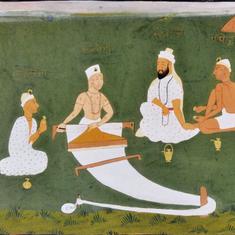Google wants to be the go-to service for the next billion internet users in India.
On December 5, the internet search giant made a slew of “India first” announcements – some new, some revamped. This included incorporating lighter versions of its signature apps as well as freshly minted ones, additional features on its payments app, and specialised navigation assistance for motorcyclists on Maps, among others.
The technology behemoth hopes these will “help more people discover how the internet can make life easier and more convenient”, Caesar Sengupta, vice-president of the company’s Next Billion Users initiative, said. The announcements were made at the third edition of Google for India, the company’s flagship annual event in the country.
“We’ll stay focused until every single Indian is connected,” Rajan Anandan, Google’s vice-president for South Asia and India, said. Despite being the world’s second-largest internet market, India has around 900 million people who do not have access to the net.
Here is everything Google said at Google for India:
Google India in numbers
The largest subsidiary of American conglomerate Alphabet, headed by India-born chief executive officer Sundar Pichai, Google has an impressive number of users for its several services in the country, as per the updates it shared on December 5:
- YouTube: Launched in India in 2006, Google’s video streaming service now has 225 million mobile viewers monthly in the country.
- Google Play: Indians account for the maximum activity on the Android operating system’s official app store with up to 1 billion app downloads every month.
- Google Stations: The company is now providing free wi-fi to 7.5 million monthly active users at 227 railway stations in India – that is more than half of its goal of creating hot-spots at 400 stations by 2018. Google will add 22 more stations by the end of December.
- Local push: Nearly a third of the search queries in India are now done by voice, and Hindi voice-search queries are growing at over 400% year-on-year.
- Tez App: Within 10 weeks of its launch, digital payments service Tez clocked up close to 12 million active users and carried out 140 million transactions. The app accounted for over 70% of the transactions through the government-backed Unified Payments Interface. (However, this momentum could be short-lived since the Reserve Bank of India is set to allow interoperability for all e-wallet players.)
Go for Google
Google, like other internet players, has been trying to launch lighter versions of its products, so that they work well on India’s slow internet speeds and on low-end smartphones. To make deeper inroads, it has launched:
- Android Oreo Go: The light version of Google’s latest operating system is designed for entry-level phones. Devices that run on Oreo Go will have low-bandwidth versions of pre-installed apps, including YouTube, Google Maps, Gmail, and Google Assistant. These apps will take up less space in the handsets and load 15% faster compared to their full-fledged versions. The India launch of Oreo Go comes more than six months after it was first unveiled at Google I/O 2017, its annual developer festival hosted in Mountain View, California.
- Google Go: This app will serve as a “Getting Started” manual for those new to the internet, letting them explore by tapping on guiding bubbles instead of typing. Users will see the latest trending queries and could easily toggle to read the answers in another language. Downloading Google Go takes less than 5MB – less than even some MP3 files – and search results are optimised to save up to 40% of data.
- Files Go: To free up phone space, this app suggests files to delete – duplicate photos, low-resolution videos, or unused apps, for instance. It also allows for offline file sharing. Reminiscent of Apple’s AirDrop feature, two users who are near each other can send files back and forth as long as they both have Files Go installed.
Payments play
In September, Google entered India’s already crowded e-transactions space with its app Tez. Until now, the service was used for peer-to-peer transactions and payments to merchants.
At the December 5 event, Google announced that Tez will start facilitating bill payments, much like its competitor Paytm already does. “More than 70 billers will be supported, including utilities and direct-to-home service providers,” Sengupta said. Among the billers included are Tata Power, MTNL, and DishTV, as well as national and state utility providers for electricity, water, and gas.
Maps for bikers
Recognising India’s status as the world’s largest two-wheeler market, Google Maps will now have a special feature: the two-wheeler mode.
“… the navigation needs of these millions of riders are different from automobile drivers,” said Martha Welsh, the director of Google Maps. “Two-wheeler mode in Maps gives routes that use shortcuts not accessible to cars. It also provides customised traffic and arrival time estimations.”
A look at two-wheeler mode in Google Maps, an India-first feature, which shows “shortcuts” not accessible to four-wheelers, major landmarks on the route, customised traffic and arrival time estimations pic.twitter.com/dzJtO2P8xj
— Sriram Sharma (@SriramVSharma) December 5, 2017
Powering Jio
Google Assistant, which has thus far run only on smartphones, will be available on a feature phone for the first time.
Google has created a special version of its virtual assistant for Reliance Jio’s “fully refundable” Rs 1,500 4G-enabled handsets. Assistant will be available on JioPhone in Hindi and English. “[It] can help make phone calls, text, play music and videos, navigate and search the internet and access other apps,” Gummi Hafsteinsson, Google’s product management director, said. Led by India’s richest man, Mukesh Ambani, Jio was launched in September 2016 promising free data during the initial promotional period. At the end of this period, it would offer the world’s cheapest internet data at Rs 50 ($0.7) per gigabyte. Jio’s subscriber base is now 130 million-strong.
Google’s Assistant is the second such feature on the JioPhone, which already has its own assistant, HelloJio. But we are guessing Google’s will be better.
This article first appeared on Quartz










